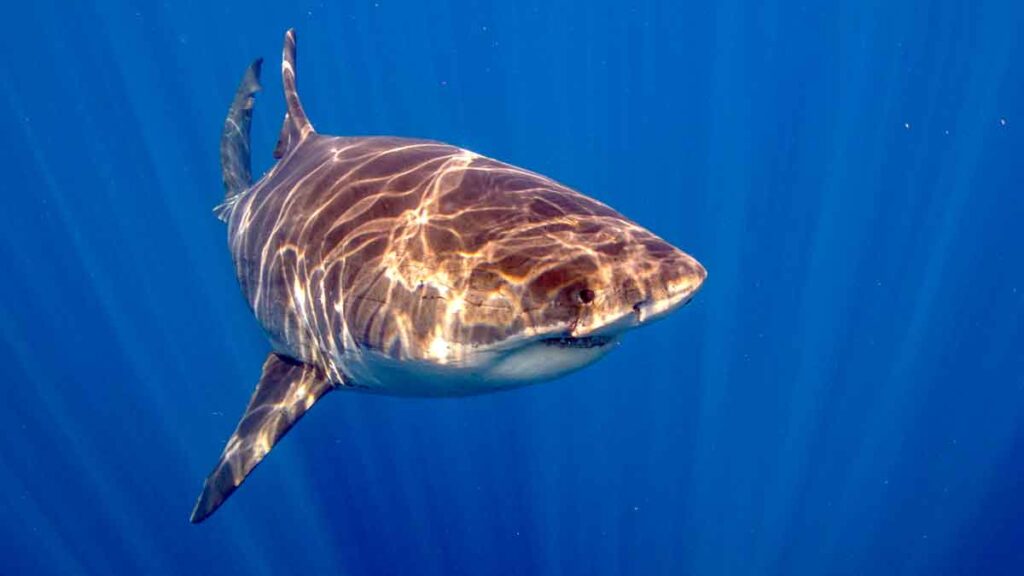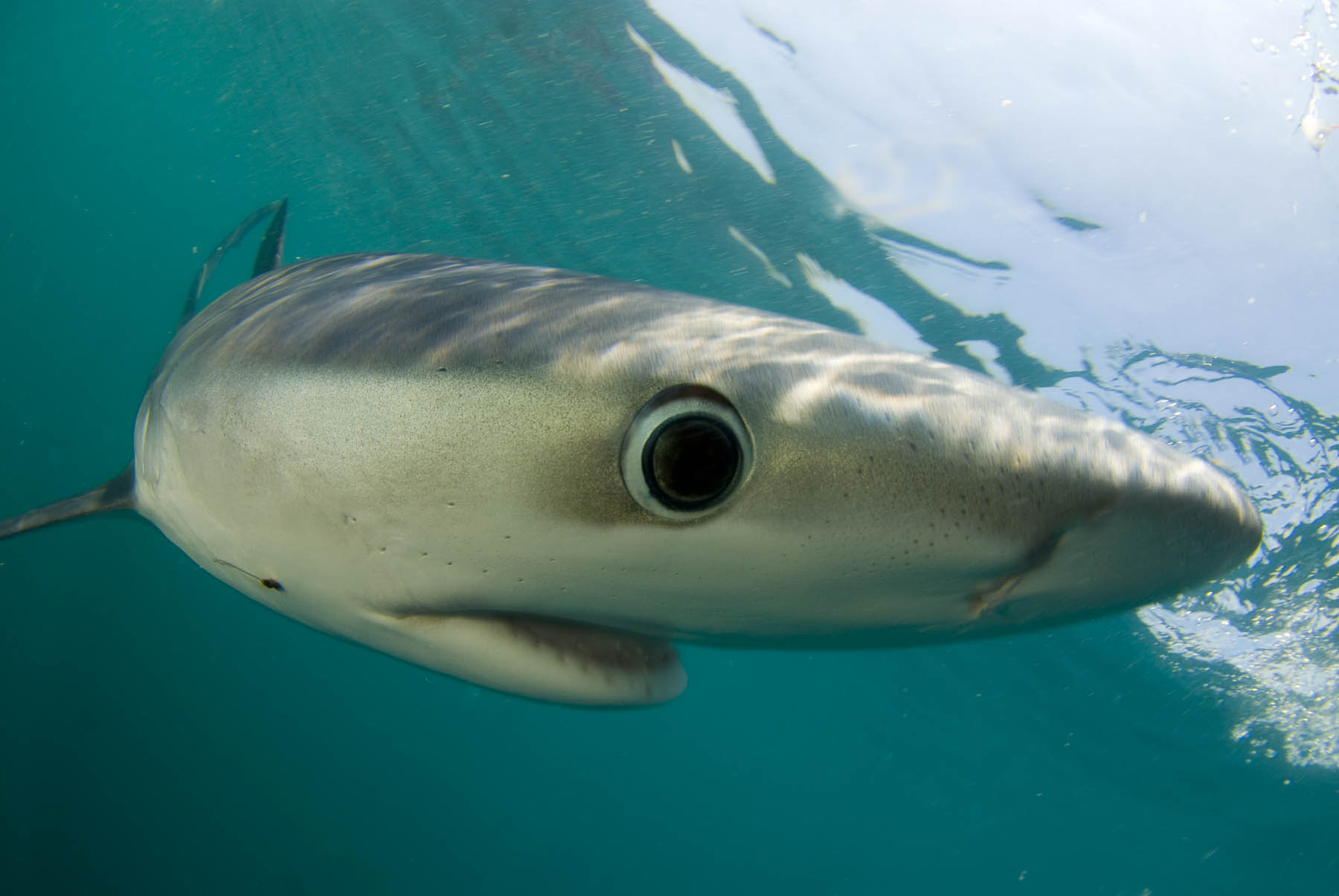2024 Expedition Dates:
Shark Viewing, Cage Diving, & Exploration
Experience the sharks of Nova Scotia from above and below the water. This expedition is all about exploration, giving participants the opportunity to experience the Ocean’s apex predator, while learning from shark experts and contributing to shark research that occurs onboard every trip. Witness the sharks above the water from the comfort of our boat or dare to experience them face-to-face underwater in our specialized shark cage; scuba-certification is not required. Air is supplied to divers in the cage via a hookah system.
On our trips we may encounter a variety of local shark species, the most common being Blue Sharks. Other species we may encounter include Great Whites, Porbeagle Sharks and Mako Sharks. We are authorized to conduct scientific research with Great White Sharks via a permit by the Canadian Government under the Species at Risk Act. Through this research, ecotourists have the privilege of joining researchers on boat-based expeditions to search for sharks, view sharks from the boat and/or underwater from the cage, learn from the research team, and observe scientific activities.
Spaces are limited; reserve your spot today.
New for 2024:
In addition to single day trips, we are pleased to offer 3-day and 5-day discounted expedition packages. Click here to view availabilities and reserve either a single day or multi-day expedition package.
All expedition costs are in Canadian dollars
Expedition Details:
- About
- What's Included
- Cost
- Expeditions run daily from July thru end of October
- Expeditions will depart and return daily Halifax, Nova Scotia (exact location TBD).
- Expeditions run daily from 8:00 am to 3:00 pm (arrive 7:15 am for check in).
- We offer daily trips and multi-day expedition packages.
- All guests receive educational briefings from our onboard marine biologist.
- Sharks can be viewed from above or below water from the safety of our cage (use of cage is weather permitting).
- Contribute as a Citizen Scientist: please consider sharing your trip photos and videos with us to help build a photographic identification database of the sharks in the region.
- Minimum age: 10 (participants under 16 must be accompanied by a parent or guardian over 19 years old).
- Sharks we may encounter include great white, blue, and mako sharks.
Included:
- Shark viewing and participating in photo identification.
- Experienced captain and crew
- Onboard snacks and refreshments
- Shark Cage diving (weather permitting)
- Mask and snorkel; wetsuits, gloves, dive hood and boots in select sizes.
- Surface supplied air via hookah system
Not included:
- Flights
- Accommodations
- Transfers to hotel or dock
- Meals
*Book online or call to reserve- 902-943-6139*
Single Day Expedition:
- Regular Guests (Ages 16+): CAD $434
- College Students: CAD $365
- Children (10-15 years old): CAD $355
3-Day Package (10% discounted rate):
- Regular Guests (Ages 16+): CAD $1,171.8
- College Students: CAD $985.50
- Children (10-15 years old): CAD $958.50
5-Day Package (15% discounted rate):
- Regular Guests (Ages 16+): CAD $1,844.5
- College Students: CAD $1,551.25
- Children (10-15 years old): CAD $1,508.75
- About
- What's Included
- Cost
- Expeditions run daily from July thru end of October
- Expeditions depart and return daily from Halifax, Nova Scotia (exact location TBD).
- Expeditions run from 8:00 am to 3:00 pm
- All guests receive educational briefings from our onboard marine biologist.
- Sharks can be viewed from above or below water on snorkel from the safety of our cage (use of cage is weather permitting).
- Contribute as a Citizen Scientist: please consider sharing your trip photos and videos with us to help build a photographic identification database of the sharks in the region.
- Minimum age: 10 (participants under 16 must be accompanied by a parent or guardian over 19 years old).
Included:
- Shark viewing and participating in photo identification.
- Experienced captain and crew
- Onboard snacks and refreshments
- Shark Cage diving (weather permitting)
- Mask and snorkel; wetsuits, gloves, dive hood and boots in select sizes.
- Surface supplied air via hookah system
Not included:
- Flights
- Accommodations
- Transfers to hotel or dock
- Meals
*Book online or call to reserve – 902-943-6139*
Single Day Expedition:
- Regular Guests (Ages 16+): CAD $434
- College Students: CAD $365
- Children (10-15 years old): CAD $355
3-Day Package (10% discounted rate):
- Regular Guests (Ages 16+): CAD $1,171.8
- College Students: CAD $985.50
- Children (10-15 years old): CAD $958.50
5-Day Package (15% discounted rate):
- Regular Guests (Ages 16+): CAD $1,844.5
- College Students: CAD $1,551.25
- Children (10-15 years old): CAD $1,508.75
No. In fact, some of the best shark viewing is above water, watching these amazing animals cruise by the boat.
No. Experiencing the sharks underwater from the safety of the cage does not require scuba diving or scuba certification. Cage divers are supplied with surface air via a hosed hookah system.
The closest major airport is Halifax Stanfield International Airport (airport code: YHZ)
- Flight times from Boston MA to Halifax ~1h 19m
- Flight time from New York NY to Halifax ~1h 46m
- Flight times from London England to Halifax ~ 6h 45m
- Flight time from Toronto CA to Halifax ~ 2h 10 m
July to end of October
Yes. Cage divers will be provided with a mask, snorkel, wetsuit (7mm), gloves, hoods, and boots.
If you have your own gear, please feel free to bring.
Nature is unpredictable and the sharks are wild. As such, we cannot guarantee shark sightings. Little is known about most sharks off Nova Scotia, so the search for these mysterious predators is a part of the adventure. On every expedition we are likely to encounter wildlife of some kind and guests always learn a lot about sharks from our on-board marine biologists and local shark experts. Even if we don’t see sharks, we still collect valuable data and have a good chance of seeing wildlife.
Visibility is variable, ranging from 5-60 ft. Average is around 30 ft.
We would like to preempt concerns raised regarding our white shark research and ecotourism activities off Nova Scotia as it relates to human safety.
Atlantic Shark Expeditions (ASE) endeavours to run an operation that contributes to scientific knowledge, is cognitive of global best practices, and provides the public with experiences that are inspiring and educational. We also hope to positively support local businesses by brining visitors to their establishments. As such we would like to preempt any concerns raised regarding ASE’s great white shark research and ecotourism activities off Nova Scotia as it relates to human safety:
- ASE will not be intentionally feeding sharks.
- ASE will not be operating in the immediate vicinity of swimming beaches or popular surfing sites.
- ASE will not be operating ecotourism trips in the absence of science. Our activities are driven by science; through this research, ecotourists have the privilege of joining researchers on boat-based expeditions to search for sharks, view sharks from the boat and/or underwater from the cage, learn from the research team, and observe scientific activities. The ecotourism funds the science.
- In addition to research, ASE expeditions are designed to shift negative public perceptions of sharks as well as enhance public understanding and appreciation of sharks. By providing guests with opportunities to experience sharks in the wild, ASE expeditions aims to help promote awareness, knowledge, appreciation, and conservation of sharks. Our expeditions also demonstrate that live sharks are valuable to local economies, drawing ecotourists and visitors to local businesses.
It is also worth clearing up some misconceptions abouts attracting sharks for research and ecotourism:
- No scientific evidence exists linking shark research or cage diving with bather risk of shark bite.
- Studies that have investigated impacts of shark dive tourism on white shark behavior, have found minimal, if any, short-term impacts.
- Attracting sharks using chum or fish parts cannot increase the number of sharks in an area, it only attracts sharks to the vicinity of the boat or cage. In fact, we go to areas where the sharks already naturally occur. If the sharks are not already in the area or coming to the area on their own accord, we will not have any success at a shark encounter.
- The idea that cage diving would lead a shark to associate a human with food is false for several reasons. First, we try not to feed the sharks. If they are able to opportunistically grab a small piece of bait, this is not intentional, nor is it enough of a food reward to cause any associations. Second, the shark doesn’t have the visual ability to distinguish the people in the cage. They likely can see the outline of the cage, but not the people within it. So even if sharks were being repeatedly fed, which they are not, any association that could possibly form would be with the cage, not with people.
- While bait is indeed used to create an attractive smell that lures sharks to the boat, the amount of bait we use pales in comparison to the copious amounts of attractive smell being emitted by their natural prey (like seals). In fact, we often focus on areas where there are lots of seals present as the seals are what attract sharks to the area. In addition to the odors emanating from their natural prey, the boat-based attractants used in our shark research and ecotourism pales in comparison to the huge amount of chumming being conducted by fisherman to catch fish. There are hundreds, if not thousands, of boats operating off the coast, that use chum and bait to attract and catch fish, often directly or indirectly capturing sharks. Sharks are not only captured on baited hooks, but they will eat fish off the hooks of fisherman before fishermen have the chance to bring in their catch on the boat. If anything, this is repeated and widescale feeding of sharks that pales in comparison to our activities.
- For an interesting discussion on how chumming doesn’t lead to increased risk of shark attack, check out: www.aaas.org/chumming-leading-more-shark-attacks
Human Safety is a priority for ASE. As such, here are important safety points we would like the public to know:
- Great white sharks are not mindless killers as portrayed in the media. They are strategic, beautiful, and misunderstood predators, deserving respect.
- Great whites have always been present in Nova Scotia, but sightings are increasing in recent years; the reasons are not clear, but it could be related to their recovering populations, increases in their prey, and warming waters from climate change.
- There are more people entering the water than ever before. This means that chances for shark-human encounters are increasing.
- Nova Scotia’s inshore waters also have poor visibility, coupled with seals often swimming nearshore.
- Taken together, more people in the water, poor inshore visibility, and presence of seals makes the chances of a white shark encountering and mistakenly biting a person a potential, but rare, reality.
- We want people to know that white sharks are here, their numbers may be rising, and that as humans, we take a risk when we go into the water, although that risk is low. So, we suggest a few tips to reduce your risk and be shark smart:
– Avoid swimming or surfing in an area if a shark has recently been spotted.
– Avoid swimming or surfing in an area if seals are present or have recently been spotted.
– Avoid swimming or surfing in an area with unusually high fish activity.
– Avoid swimming or surfing in an area that someone is actively fishing or has recently been fishing.
– Avoid swimming or surfing alone.
– Avoid swimming or surfing during low light conditions (dawn, dusk, night).
– Avoid wearing exposed jewelry that could reflect light and resemble the scales of a fish.
– If you feel strange or uncomfortable, get out of the water. People that have been bitten sometimes report having a strange feeling prior to the bite; it’s possible your subconscious mind is picking up on warning signals that your conscious brain doesn’t.




